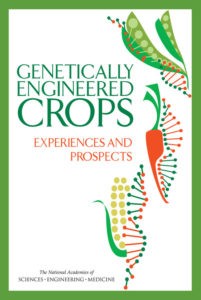Science is the standard that has been used for decades to find solutions, innovate and improve efficiencies, but increasingly, society is less certain about science and reassurances are sought through socio-economic assessments. There are two options to assess risks of new technologies and products: the first, to use strictly science-based approaches and ignore all of the socio-economic concerns; and the second to use science-based risk assessment to highlight socio-economic concerns. However, both methods have had limited success if reassuring the public about the safety of Genetically Engineered/Modified (GE/GM) crops. Acknowledging that non-science concerns exist is not a flaw of a science-based regulatory system, but is rather an evidence that science needs to do a better job of communicating about how risk assessments are done and what this means for individuals.
 Yesterday, The National Academy of Sciences (NAS), released a report on Genetically Engineered (GE) Crops. The NAS is a private non-profit organization in the USA, which “is charged with providing independent, objective advice to the nation on matters related to science and technology”. Members of NAS are peer-elected researchers who have made outstanding contributions in science. In the coming days and months, this report will be greatly discussed and debated. It is a fresh starting point of reference for GE crop science.
Yesterday, The National Academy of Sciences (NAS), released a report on Genetically Engineered (GE) Crops. The NAS is a private non-profit organization in the USA, which “is charged with providing independent, objective advice to the nation on matters related to science and technology”. Members of NAS are peer-elected researchers who have made outstanding contributions in science. In the coming days and months, this report will be greatly discussed and debated. It is a fresh starting point of reference for GE crop science.
So, what did this report find and why is it important? First, the report is the collaboration of 20 committee scientist who reached consensus on GE crop science upon reviewing over 1000 articles. The committee went to great lengths to ensure that the concerns of those critical of biotechnology and GM crops were heard. The conclusions of the committee are that GE crops are safe for the environment and consumers. Yet, more importantly, this report states that science needs to do a better job to communicate to the public.
This report has been diligently researched, written and reviewed. The report will help to shape future research, guide policy development and encourage greater science communication. With a sprinkle of fortune, perhaps the pro and anti-battles of the past 20 years can now be set aside and that the agriculture industry can move forward in a more cooperative approach to seriously addressing global food insecurity. Hundreds of millions have been wasted in waging public battles while nearly 2 billion people in developing countries do not receive enough nutritious food on a daily basis. This is the REAL challenge facing agriculture and society.
If you are someone who has concerns about GM crops and/or food products SAIFood suggests that you check out the NAS web page to learn more about the committee, the review process and the report itself. For anyone who has the time you can read through the full document, or read the shorter briefing! It would be great if we were all more informed on how science in GM crops is moving forward.

